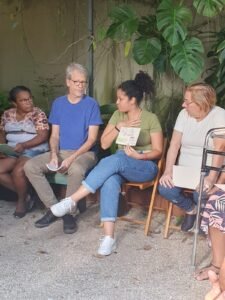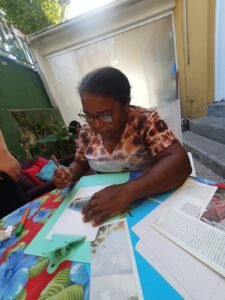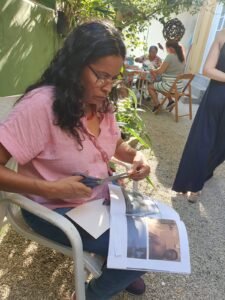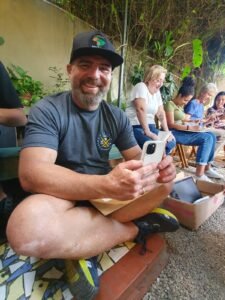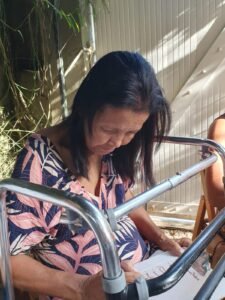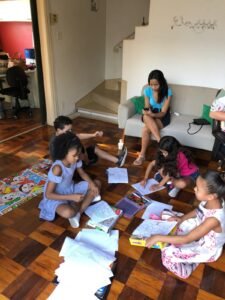This article was translated by Israel Carvalho, a volunteer participant in the Translation Community at Instituto Elos.
First, it is necessary to say that the phrase above is from Mariana Felippe, one of the territory articulation network managers, which is: the meeting of leaderships of Baixada Santista with whom we work today or at some previous time. On Saturday, the 27th, this group got together for the first time this year. There were 26 people, from 5 cities: Santos, Cubatão, Praia Grande, Guarujá and Peruíbe.
“We want to build a safe space in which leaders can exchange with each other what they know and what they are doing”, explains Natasha Mendes Gabriel, Movement coordinator, area in charge of this project within the Elos Institute.
She says that these people, who are every day on the front line of social work, face similar challenges, go through similar situations and often don’t have a place to talk about it, to exchange about it. And this is where Mariana comes in, again.
“We can notice”, she says, “that there is a very strong feeling of loneliness among these leaders. They do a lot of things on their own, feel that there is no recognition of their work or that people do not fully understand what they are doing. In addition, there is a lot of pressure coming from all sides. Who supports it?”, analyses Mariana. That is why and for that reason that this work of articulation with territories of Baixada Santista exists, she explains:
“When we are together we can share the pains, the challenges and the solutions that each place has found. You have to bring people together to let them know that they are not alone in doing what they do”.
This project was born from a survey by the Elos Institute, still in 2022. At the time, the Movement area interviewed leaders to draw up profiles, understand the nature of their works, the challenges of each territory and how the Elos Institute could be a strategic ally in the medium and long term.
Having a space for exchange and development appeared as a necessity during the interviews. The study will be told soon around here.
Nobody knows more, we know differently
“The meeting was very important for me”, says Elizabeth Alves. She has lived in Vila Israel for 8 years, one of the first residents of the place. “It’s important to tell what we’re doing, but also to listen to what other communities are doing, you know. This way, we learn from each other”. José Domingos thinks very similarly, take a look:
“Because you can bring an idea that you heard there at the meeting to your home, which will contribute there in your territory. Oftentimes you are working in one direction, then you discover that it is not the best one at times like these”. Domingos, who has lived in Pilões for 22 years, says that “Elos does this very well, by bringing leaders together to talk. Elos is like a bridge”. We like that image, Domingos.
In addition to Vila Israel and Pilões, the meeting was attended by leaders from Vila Pantanal, Vila Dos Criadores, Monte Serrat, Vila Esperança, Instituto Novos Sonhos, Biblioteca Comunitária Conto de Fadas Periférico (Peripheral Fairytale Community Library), Editora Periferia tem Palavra and Coletivo de Mulheres Caiçaras (Collective of Caiçaras Women).
Next Moves
The meetings will be regular, from now until December. For the next one, the Elos Institute will detail what it has discovered with the community survey. It will also be the time to map the common interests for the construction of an agenda of studies and exchanges throughout the year.
